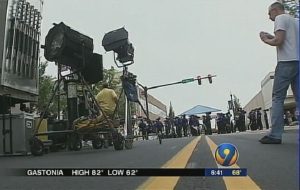Amid stiff national and global competition, Cape Town is a popular ‘homeland’ for film shoots.
More than 11 500 location sites were booked and 7 372 filming permits issued between 1 July 2013 and 23 June 2014 for various shoots. This affirms the city’s status as a competitive and attractive location destination.
Reaching out to touch the stars in Cape Town is quite literally possible, given the number of celebrities spotted around the city recently: at famous eateries, hotels, and taking smoke breaks on sidewalks.
Filming of the popular television series ‘Homeland’ at various locations across the city is creating much excitement among locals, especially for those chosen as extras in the series.
The City’s competitive film tariffs and user charges for filming ensure that Cape Town remains an attractive option in terms of production costs. The tariff structure acts as an incentive and in so doing helps to stimulate the local economy through generating increased opportunities for both local and international production companies. A host of subsidiary industries and sectors that support film-making in the city also stand to benefit.
‘The local film industry contributes approximately R5 billion to the economy and has over the past three years created more than 35 000 jobs. The film industry is labour intensive and therefore has a long value chain. The film production sector also adds value to a wide range of other sectors in the local economy through the creation of demand for products and services – with links to the tourism sector being particularly strong. The industry showcases Cape Town, its diversity of locations, technical film capacity and talent, and also provides value-added marketing and investment collateral for the city,’ said the City’s Mayoral Committee Member for Tourism, Events and Marketing, Councillor Garreth Bloor.
Cape Town’s downtown streets are commonly used as production locations because they work as many different cities in the world, while iconic buildings like the Darling Street bank building are always in demand as they have character. The CTICC is well used as it can be itself but also stand in as an airport hall, and the iconic Artscape Theatre was recently turned into the American embassy for the for the series ‘Homeland’. One of most popular sites has been the cut-off freeway on the foreshore, which is the biggest unintended boon to the film industry.
‘This booming industry also ensures valuable skills transfer from international crews to our local crews which is critical to the future sustainability of the industry,’ added Councillor Bloor.
The economic impact across the sectors for the filming of a feature film, using ‘Safe House’ as one example, can be illustrated as follows:
• Job creation: a crew and cast of approximately 860 people were employed for varying periods, but in most cases in excess of six months. The total payroll spend was approximately R40 million. In addition, approximately 5 000 people were hired as front-of-camera extras, adding another R3 million to the payroll.
• Training: a record-breaking 22 trainees were involved in the production of ‘Safe House’. The total value of the training was in the region of R1 million. Invaluable on-the-job training was also derived from the international key crew (many of whom are Oscar-winners in their respective fields) who worked hand-in-hand with local crew members. Forty local actors also had the opportunity to work alongside and learn from acting icons such as Denzel Washington.
• Car rental: a total of R5,8 million was spent across a number of Cape Town car and truck rental companies.
• Hotel accommodation: R11,3 million was spent across a number of Cape Town hotel establishments.
• Catering: R5,5 million was spent with Cape Town-based caterers who had to gear up their crews to cope with the numbers, which was another area of job creation especially for small businesses.
• Per diem: a total of R6 million was paid out to foreign crew and cast in per diem allowances, which was in turn spent in local restaurants, bars, shopping centres and cinema complexes.
The important contribution of the creative industry is impressive and confirms the city’s status as World Design Capital 2014.







